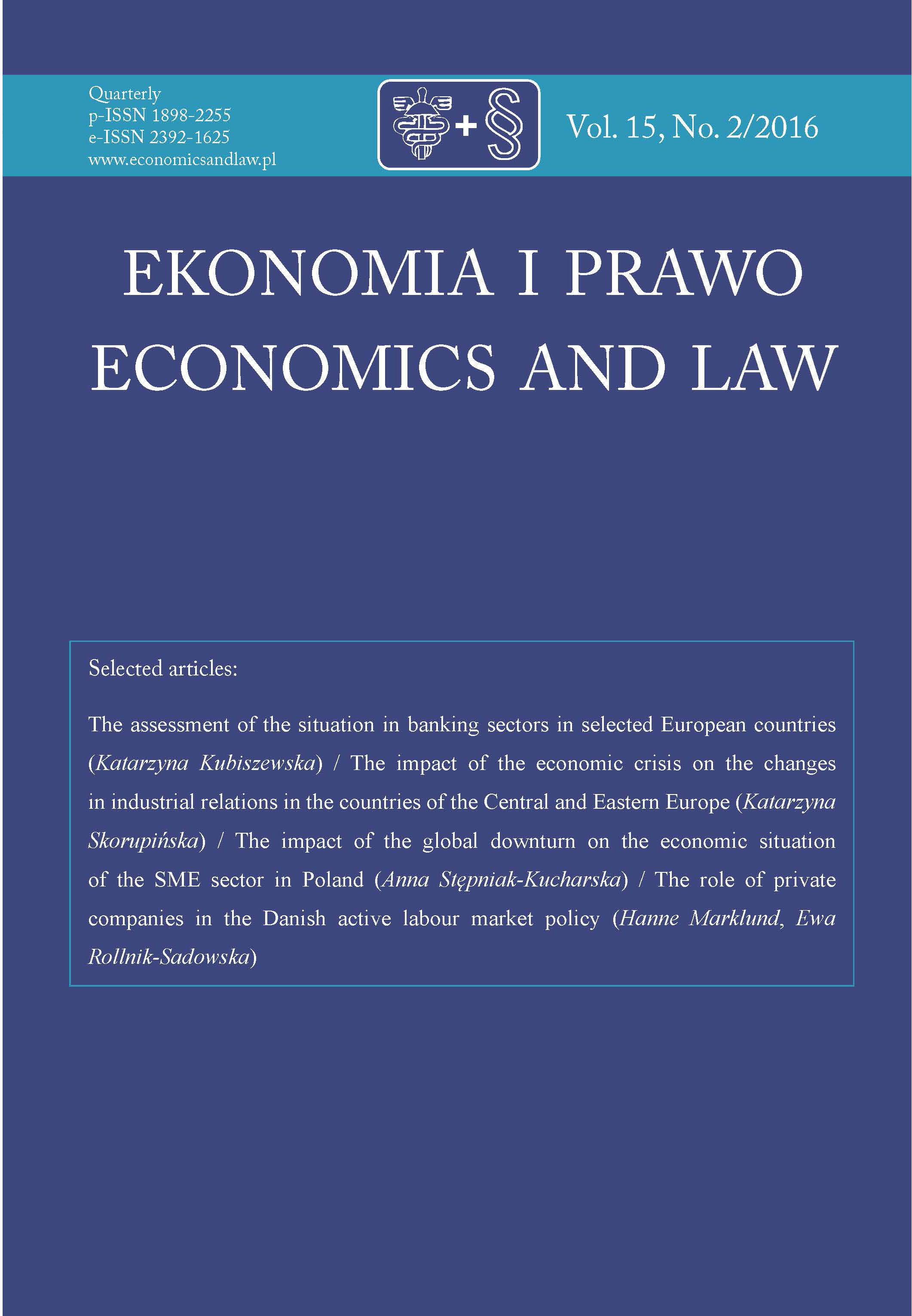THE INSTITUTION OF INTELLECTUAL PROPERTY RIGHTS PROTECTION IN THE FACE OF ECONOMIC CRISIS
DOI:
https://doi.org/10.12775/EiP.2016.010Keywords
economic institutions, economic slowdown, IPR protectionAbstract
Nowadays proper protection of intellectual property rights (IPR) is particularly important for strengthening and accelerating economic growth and development. Contemporary society is in transition, from community which wealth is based on tangible assets, to a community which relies mainly on intangible resources. IPR are understood as an institution which guarantees the access to these resources and secures the legal rights of owners. In modern world there are many factors which influence the necessity of stronger IRR protection. Some of them appeared especially during times of economic slowdowns, when the IPR are specially exposed to illegal actions. If the legal system is properly organized and the law is enforced the intellectual property rights seem to be secure. Unfortunately the process of globalization, lack of technical barriers in information flow, decreasing purchasing power of households and poor economic situation of firms operating in competitive environment increase the uncertainty and possibility of illegal actions especially during recession. The main aim of paper is to identify the channels through which financial crisis affected world economy and intellectual property rights protection. It can be done by describing mutual relationship between the IPR protection and business cycle, mainly phases of recession. The first part of the paper shows the current state of knowledge. Then in the second part the main analyzed economic categories are briefly described. In the last part of the paper the relationship between economic crisis and IPR protection is presented in the context of institutions.
References
Benoliel D., Gishboliner M., The Effect Of Economic Crises On Patenting Activity Across Countries, “Journal of Intellectual Property”, Vol. 14, No. 2/2015.
Bochańczyk-Kupka D., Ochrona własności intelektualnej i jej pomiar — problemy metodologiczne, “Studia Ekonomiczne. Zeszyty Naukowe Uniwersytetu Ekonomicznego w Katowicach”, No. 236(2)/2015.
Bochańczyk-Kupka D., Pęciak R., Institutions in the context of sustainable develop-ment, “The Macrotheme Review”, No. 4(5)/2015.
Chopra S., Negi A., Role of Intellectual Property during Recession, “Journal of Intellec-tual Property Rights” Vol. 15, No. 2/2010.
European Commission, Economic Crisis in Europe: Causes, Consequences and Re-sponses, “European Economy”, No. 7/2009.
European Commission, Growth, Internal Market, Industry, Entrepreneurship and SMEs, http://ec.europa.eu (1.09.2015).
European Commission, Results at the EU border 2010, http://ec.europa.eu (22.08.2015).
Gamberoni E., Uexkull E., Weber S., The Role of Openness and Labour Market Institu-tions for Employment Dynamics during Economic Crises, “Employment Sector Employment Working Paper”, No. 68/2010.
Hodgson G.M., Recent Developments in Institutional Economics, Edward Elgar, Chel-tenham 2003.
Idris K., Intellectual Property as a Power Tool for Economic Growth, WIPO, Geneva 2003.
Kenavy E.M., The Economic Impact Of Counterfeit Goods In Egypt, “International Journal of Business Management & Research”, Vol. 3, No. 3/2013.
Lewis K., The Fake and the Fatal: The Consequences of Counterfeits, “The Park Place Economist”, Vol. 17/2009.
Maskus K.E., Intellectual Property Rights And Economic Development. Revised Draft, prepared for the series “Beyond the Treaties: A Symposium on Compliance with International Intellectual Property Law”, organized by Fredrick K. Cox Interna-tional Law Center at Case Western Reserve University , February 6, 2000.
Nelson R., Technology, Institutions and Economic Growth, Harvard University Press Cambridge 2005.
North D.C., Institutions, Institutional Change and Economic Performance, Cambridge University Press, Cambridge 1990.
Veblen T., The Place of Science in Modern Civilization, “American Journal of Sociolo-gy” Vol. 11, No. 5/1906, http://dx.doi.org/10.1086/211429.
World Trade Organization, Trade to Expand by 9.5% After a Dismal 2009, https://www.wto.org/english/news_e/pres10_e/pr598_e.pdf (15.08.2015).
Downloads
Published
How to Cite
Issue
Section
Stats
Number of views and downloads: 607
Number of citations: 0
